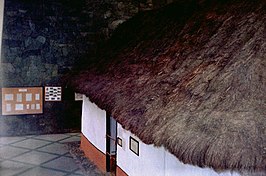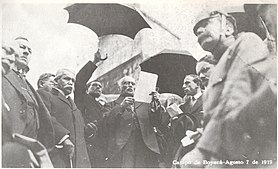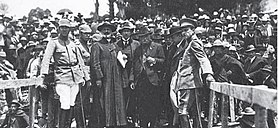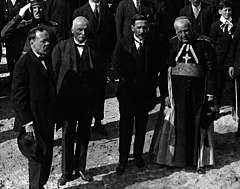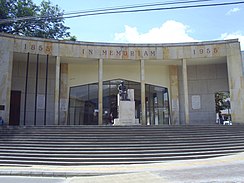Marco Fidel Suarez
Marco Fidel Suárez Barrientos (Hatoviejo, April 23, 1855 - Bogotá, April 3, 1927) was a Colombian writer, obituary, diplomat, statesman, philosopher, educator, professor and politician., member of the Colombian Conservative Party. He held the post of President of the Republic between 1918 and 1921, when he was forced to resign.
Coming from a family with few resources, throughout his life he held various jobs as a teacher, writer and later chancellor along with other political offices, where he was able to gradually acquire knowledge, until his clerical training during his adolescence. He then served as a military man until his withdrawal following the defeat of his cause.
Since 1896, Suárez entered the world of politics, so foreign to his spirit and peaceful character. It was one of the frames and references of the world that demanded a rigid temperament that was not his. He always felt lost in a jungle where his words were misinterpreted and his motives distorted.
He was an outstanding writer, his letters appearing published in the History and Antiquities Bulletin of the National Academy of History (of which he was a member), in the Official Gazette (the official government gazette), magazines Illustrated Colombia, Mundo Al Día and Cromos; and in the newspapers Repertorio, the very popular Papel Periódico Ilustrado, El Correo Nacional, El Nacionalista, The New Time, among many others.
He was also a prominent obituary, that is, a writer on the lives and works of important people in the country and who had already died at the time they were published. His extensive work on this matter is cited as an important cultural and historical reference in Colombia, being himself a pioneer in this matter.Equally, his satirical and semi-autobiographical work Sueños de Luciano Pulgar deserves special mention..
He was Chancellor of Colombia in three different governments, standing out in all 3 for his diplomatic skills and his pacifist positions. In his diplomatic assignments, he took charge of the Santiago Pérez Triana affair, established commercial relations with Spain, France, Italy and Germany; and he adopted the Respice Pollum doctrine, with which Colombia definitively aligned itself with the policies of the United States, and which is still in force to date.
He was elected president of Colombia in 1918, supported by the clergy and the government sector of his party. His government developed in the post-World War I scenario, the growth of socialism in Europe, the modernization of the country, and the 1918 flu pandemic. He supported and backed the United States and its interventionist policies known as "Great Garrote" He was the architect of Colombian aviation, both civil and military, since he founded the company Scadta (today Avianca) and laid the foundations for the creation of the Colombian Air Force.
Biography
Suárez was born in a humble hut on April 23, 1855 in Hatoviejo (now Bello, Antioquia), in the Republic of New Granada, in the home of the humble worker Rosalía Suárez (born in San Pedro de los Milagros)., who worked as a laundress, cookie maker and mother head of the household. Marco Fidel was the extramarital (natural) son of José María Barrientos Jaramillo.
Little Marco Fidel sold his mother's cookies before school, but had to withdraw at an early age due to his mother's financial problems, allegedly being forced to take his classes through his school window. However, his good performance caught the attention of the Catholic priest Joaquín Bustamante, who adopted him as an apprentice and took him with him to the towns of Fredonia and La Ceja, where his education improved considerably.
Seminar and journalistic beginnings
At the age of 14, in 1869, he was admitted to the Medellín Seminary, thanks to the recommendation of his teacher and Father Joaquín Tobón. There Suárez graduated in Latin, philosophy, theology, canon law, bibliology, dogmatics and ecclesiastical history. He also collaborated in the newspaper Repertorio Colombiano , owned by Carlos Martínez Silva.From 1872 he also dedicated himself to teaching, replacing one of his professors, in the same subjects described above, and He excelled as a speaker. Additionally, in 1873 he became a contributor to the small newspaper El Seminarista .
He graduated with excellent grades in 1876, in the midst of the social crisis caused by the radical government. Despite his impeccable career, he was not allowed to be ordained a priest, due to his extramarital origin, which caused him immense disappointment, because in addition to his vocation, he considered that his austere life in childhood was in accordance with the vows of poverty of the profession.
Military careerː Conservative Revolution of 1879
He remained in the male school in his native Hatoviejo, where he worked as a teacher and director, until 1879, when he joined the army of his department, commanded by Braulio Jaramillo, after a military outbreak against the local government due to the anti-clerical measures of the liberals.
Back in his hometown, Suárez was reunited with his mother and sister, and briefly returned to teaching for the remainder of the year. He was later named lieutenant but the defeat of his unit forced him to retire to Santa Rosa de Osos, and later he returned to Hatoviejo.
Arrival in Bogotá and teaching
In 1880 he traveled to Bogotá, in what is described as a journey against adversity, since legends abound indicating that he did it on foot and even barefoot. Having recently arrived in the city in August, he appeared at the Colegio del Espíritu Santo, also directed by Marínez Silva, where he presented himself with his seminary credentials.By 1881 he himself was teaching classes at the academic center.
At the Colegio del Espíritu Santo, Suárez came to teach classes with other prominent professors such as Miguel Antonio Caro, young men from the capital's elite such as Antonio José Cadavid, José Vicente Concha and Miguel Abadía Méndez, whom he would see again years later as their peers.
He went on to win an essay contest in honor of the centenary of the birth of Chilean educator Andrés Bello in 1881, as he had studied the educator's work during his seminary days. His work was later published by the Colombian Academy of Lengua in 1884 (which it entered in 1881) and in 1885 it was published in Spain. In that same decade, he collaborated with the project Illustrated Newspaper Paper , by Alberto Urdaneta, and taught diplomacy at the Universidad del Rosario, a chair in which he also excelled during his stay at the seminary in Medellín..
Political beginningsː Ministry of Foreign Affairs (1891-1896)
Given his vast experience in the international field, the conservative president Carlos Holguín appointed him chancellor of his government, from May 10, 1891 to August 7, 1892, replacing Antonio Roldán. As the country's Minister of Foreign Affairs, Suárez entered into a treaty of friendship, commerce, and navigation with the German Empire; an extradition treaty with Spain, and one with France on commercial matters. He also made a treaty with Italy, further ending his territorial claims.
His success in the international field led the new president to confirm him in office until May 11, 1896. His expressions against the liberals, during the government of Miguel Antonio Caro -since Suárez said that liberalism was a "disgusting canker"-, earned him the nickname Mark the Ripper from his rivals. It is worth noting the problem of the dual nationality of the politician Santiago Pérez Triana (son of former President Santiago Pérez), since he was involved in a problem of alleged falsification of documents, for which Súarez requested support from the US government to solve the matter.
Government of Sanclemente (1898-1900)
On August 7, 1898, he was appointed Minister of Public Instruction by the octognarian nationalist president Manuel Antonio Sanclemente, who was supported by Caro during his controversial presidential election. On July 31, 1900, the elderly President Sanclemente fell and Vice President José Manuel Marroquín assumed power fraudulently. Suárez left the ministry in protest of what he considered a coup and wrote a protest against the new government ː
"The undersigned, Minister of Public Instruction, in charge of the office of the Treasury, says in this book a formal protest against the attack that, according to notorious, committed last night several armed individuals and Mr. José Manuel Marroquín, usurping the first magistrate of the State and unknown to the very late Doctor Manuel Antonio Sanclemente, who, since November 3, 1898, was exercising constitutionally and legally.
(...)
Not being able to consulate this protest with the former President or my colleagues, I am obliged to formulate it alone, which I do, not to solemnize the role of victim or to raise the opinion against the attack last night, nor to do wrong to any person, but because I believe that an inexcusable duty forces me to raise my voice, even if it is weak, against the interruption of the constitutional regime and against the ignorance of the government. "Marco Fidel Suárez, 31 July 1900
Out of government, Suárez devoted himself fully to his wife and children, and withdrew from all political work.
Return to government
On November 23, 1911, the Republican president Carlos Eugenio Restrepo called him to be his Minister of Public Instruction, being the second time he held that position, remaining in it until February 12, 1912. In 1913 Suárez he chaired the Foreign Relations Advisory Commission, and participated in the commission sent by President Restrepo for the signing of the Urrutia-Thompson Treaty, on April 6, 1914; agreement between the United States and Colombia.
Colombian Foreign Ministry and leadership of Conservatism (1914-1917)
After his former student, José Vicente Concha, was elected president, he had to leave the leadership of the Conservative Party, and recommended the election of Suárez in the position, since his presidential inauguration was close. Suárez remained in the leadership of the party throughout the Concha government, despite the fact that both were ideologically opposed, but decided to cooperate in the name of harmony in the country.
Additionally, on August 7, 1914, President Concha appointed him as Minister of Foreign Relations of his government given his conciliatory abilities and the experience that accredited him, being the second time that the politician held that post. Suárez's work was key to maintaining Colombia's neutrality in World War I, managing to seal alliances with neighboring countries. As foreign minister, Suárez found himself confronted by the Colombian press, pressure from both sides of the conflict (who accused to Colombia for not complying with its neutrality) and members of political parties, since there was a pro-war faction within their own party.
His work as party director favored the national understanding he was seeking to maintain the country's neutrality intact. The neutrality responded to the strong influence in Colombia of Germans, French and English alike; recent events in Panama; the boredom of the population with the Thousand Days War; and the economic and military insufficiency of the country to participate in the hostilities.
Presidential candidacy
In 1917, the conservative majority in Congress launched Suárez's candidacy for the presidency. On August 12, a public demonstration in support of said candidacy was held, and upon accepting Suárez said: "Colombia's soil is sterile for the seeds of arbitrariness." Due to his presidential candidacy, and inconveniences with the exercise of the position, Suárez resigned on October 29, 1917 from his position as chancellor of Colombia.
Suárez faced the Conservative Union and the support of liberal leaders Benjamín Herrera, Eduardo Santos (director of El Tiempo), and the director of the newspaper El Espectador Fidel Cano, who supported the conservative poet Guillermo Valencia, and the minority sector of liberals who supported José María Lombana. Despite this fierce opposition, Suárez prevailed over Valencia by a considerable difference of 10% of the total vote.
Presidency (1918-1921)
Suárez took office on August 7, 1918, in the National Capitol, taking the oath of General Pedro Nel Ospina, president of Congress. On July 25, Congress had elected Ospina himself and also the conservative Pedro Antonio Molina as presidential appointees. Subsequently, Congress chose Jorge Holguín as second designated, after the appointment of Molina in the government portfolio.
Ministerial Cabinet
Suárez's government was the first and only to date, in which the protocol position of first lady was held by the daughter of the head of state, and not by his wife, as is customary. Thus, María Antonia Suárez Orrantia held the position to replace her mother, who died a few days after the birth of Marco Fidel's second son, Gabriel Suárez, several years before she wanted to think about running for president.
Shortly after his possession, on October 14, 1918, Suárez again suffered a loss in his family. In Pittsburgh, United States, at the age of 19, his son Gabriel died, a victim of the 1918 flu. Suárez had arrived in the country in 1916 to study electrical engineering. The death of his son at the very beginning of his government affected Suárez so much that he wanted to travel incognito to visit his son's grave, but he did not succeed.
Safety and public order
He had to face an unprecedented governance crisis, because his cabinet was dissolved two months later, only achieving the loyalty of the Treasury Minister, Esteban Jaramillo, throughout his turbulent presidential term, and a key figure in the conflicts that led to the fall of Suárez at the end of November 1921. The foreign investment problem of 1919, provoked by his Treasury minister, led to the tension of relations between Colombia and the United States.
Tailors Massacre
August 7, 1919 marked the first centenary of the Battle of Boyacá (which determined the definitive independence from Spain) and a military parade was planned among the celebrations. But the officers and troops lacked adequate uniforms and the Army Intendant General entered into a contract with Agustín Pastor for the supply of ten thousand "barracks dresses". But the artisans, encouraged by some agitators, protested against the purchase of these uniforms and the importation of boots, alleging that these same items of equal or better quality were made in the country.
On March 15, in a session of the Council of Ministers, it was decided not to approve the contract signed with Mr. Pastor, but the demonstration was already organized. The demonstrators went to the Presidential Palace where they demanded the presence of the president on one of the balconies. Suárez came out and read them the response to the requests made. But it was raining heavily and he could not make himself heard over the shouts of the workers.
He then made the organizers go up to the Palace halls to explain to them that the decree had been repealed and that there was no longer any reason to protest. The crowd began to shout slogans against the government and long live the liberal party and socialism, spirits flared and the organizers could no longer control the demonstrators, who began to throw stones and other artifacts. The enraged workers attacked the soldiers. A discharge was heard and between the panic of the demonstrators and the anguish of the organizers it was discovered that the discharge left at least 20 dead and 18 injured.
In the Official Gazette of March 29, 1919, three reports submitted to the Ministry of War by General Pedro Sicard Briceño, Captain A. Tamayo and General Juan F. Urdaneta appeared, in which they reported that "shots were fired into the air in order to defend the Palace and the person of the president, but it was not known who gave the order to shoot against the people. This event marked the separation between the government and the opposition, which intensified its accusations, turning Suárez against party leaders Laureano Gómez, Eduardo Santos, Alfonso López Pumarejo, Benjamín Herrera and Enrique Olaya Herrera.
Economy
Post-war economic problems in Europe were not alien to Colombia either, which was affected by rising prices, unmanageable inflation, and unemployment and bankruptcy of companies throughout the country. To stop the advance of the crisis created the income tax, on November 27, 1918. The constant attacks he was subjected to led Suárez to inaugurate the column, Erasmo el Meager, in the Official Gazette, where he wrote as a contrast to his opponents, with black humor and satire typical of his youthful years as a journalist.
Various works
On July 9, 1919, Suárez and the Colombian government led the consecration of Colombia to the Virgin of Chiquinquirá, a 16th century image . The ceremony had been planned since 1910, when Pope Pius X authorized the coronation of the image with a crown of gold and emeralds, and a golden scepter. The ceremony was held in Tunja, where all the country's Catholic leaders attended, including Suárez himself. The celebration was authorized and supervised from the Vatican by Pope Benedict XV, who sent a delegate to Colombia.
At the beginning of 1920, Suárez began a tour of the south of the country, enthusiastic about the success obtained in his foray along the Atlantic coast. He founded the aviation company SCADTA (Sociedad Colombo Alemana de Transporte Aéreo) in Barranquilla, which was inaugurated in July 1920, and which in 1928 would become Avianca. Suárez also created the Boyacá Cross with the aim of highlighting the work of those outstanding army officers; decoration that was later extended to civilians and that today constitutes the highest award that the President of the Republic can bestow.
Foreign Policy
The government of Suárez, a supporter of the US capitalist system, took a dim view of Russia's Bolshevik influence in Colombian territory. Workers and artisans led by the liberal writer Max Grillo, were seeking the creation of the first Colombian communist party, and throughout the country they provoked several delicate strikes, with a total of 500, and all of them led to a culmination by Minister Jaramillo.
In obvious contrast, the Suárez government became adept at the US expansionist policy known as El Gran Garrote. In fact, Suárez himself enshrined the motto respice polum (Look towards the North Pole), in clear allusion to the United States, as a national reference for Colombia.
Resignation
After all the social and economic problems, the straw that broke the camel's back was a letter sent by Suárez to the US government, requesting the removal of Alfonso López Pumarejo and Luis Samper Sordo from the Colombian branch of Banco Mercantil Americano, based in NY. The letter was leaked to the Colombian press on August 18, 1919, and except for one newspaper, the entire Colombian press declared itself in opposition to Suárez, in addition to the attacks that López and Samper personally launched against the president.
In 1920 the situation was complicated by the drop in the price of coffee, a conflict between Congress and the political parties for the approval of a bilateral treaty with the United States, and pressure from Laureano Gómez, through the Chamber of Representatives exercised over the citizens, and every day the situation for Suárez was more unmanageable.
In September 1921 the American Mercantile Bank scandal reappeared. To this were added numerous proposals, the withdrawal of support from his former political allies, the resignation of his cabinet once again and his impossibility of recomposing it for a month; and the serious intention of Congress to remove Suárez from office, after the approval of a motion of censure against him that same year.
On November 4, 1921, Suárez had reached an agreement with the opposition and offered to retire on the condition that Jorge Holguín (a distant relative of his deceased wife) be chosen to replace him. On November 9, 1921, Suárez sent a letter to the president of the Senate in which he informed him of his determination to separate from the presidency. Two days later he made that separation effective and the first designated, Jorge Holguín, assumed command.
When Holguín was elected, President Suárez made his retirement effective, as a leave of absence, from November 10 until the end of his constitutional mandate in August 1922. President Suárez never resigned from the presidency of Colombia.
Post-government
Suárez retired from politics, dedicating himself fully to journalism and literature, despite the fact that he alternated his activities with occasional government assignments in the Colombian Foreign Ministry.
He published in the newspaper El Nuevo Tiempo -which remained loyal to him during his chaotic government- deliveries of his literary work Sueños de Luciano Pulgar, a satirical work that was directed at the opponents during his government, and which is considered a literary reference in Colombia, due to Suárez's inspiration in the works of classics such as Rufino José Cuervo, Rafael María Carrasquilla, Miguel Antonio Caro and Antonio Gómez Restrepo. The deliveries were published between March 10, 1923 and March 9, 1927 and consists of 12 volumes.
Diplomatic assignments and last years
In 1924, in the government of Ospina Vásquez, Congress appointed Suárez as delegate to Peru for the celebration of the centenary of the Battle of Ayacucho, but he himself resigned the appointment on November 14 of that year. Then, on February 21, 1925, Congress appointed him part of the advisory commission of the Ministry of Foreign Affairs.
On August 7, 1926, the newly inaugurated conservative president Miguel Abadía Méndez appointed him as foreign minister for the third time, but Suárez resigned on January 12, 1927. Even so, Congress reelected him to his position as adviser in the Foreign Ministry, now under the tutelage of Foreign Minister Carlos Uribe.
Death
Marco Fidel Suárez died at 11 pm on April 3, 1927, at the age of 71, receiving the Catholic sacraments proper to death on March 29, by the priest Elíecer Gómez. His body was exposed in a burning chamber in the Primada Cathedral of Bogotá on April 5, with the presence of President Abadía and other illustrious characters.
Family
Marco Fidel was the illegitimate son of José María Barrientos Jaramillo with the humble worker Rosalía Suárez. Rosalía was also the mother of Soledad Suárez, who became a lifelong companion of Marco Fidel. According to the present consensus among Colombian genealogists, José María Barrientos, who was part of the Antioquian elite of the second half of the century XIX and first XX century, he would have had an affair with Rosalía Suárez and would be the father of Marco Fidel Suárez. If he had been recognized by his father, his last names would be Barrientos and Suárez.
José María's father, Félix Barrientos Villa, was the brother-in-law of Governor Alejo Santamaría Bermúdez. He, in turn, was the grandson of Enrique Barrientos Ruiz, uncle of the Governor of Antioquia Estanislao Barrientos Villa and of the sisters Marcelina, María del Rosario and María Antonia; the first two were the wives of Mariano Ospina Rodríguez and the third of the banker Julián Vásquez Calle, who was also a relative of the soldier and governor of Antioquia Alejandro Vélez Barrientos.
Despite the fact that legal recognition was not given due to Suárez's own refusal -as it is known that Barrientos intended to recognize it when Marco Fidel was 26 years old and already enjoyed prestige as a writer- he and his father maintained a close relationship through private correspondence, in which the relationship between the two was alluded to. In said correspondence it was learned that José María Barrientos allowed his son to use the surname, but Suárez evidently refused, giving his mother the importance he considered appropriate.
Marriage
Suárez married Isabel Orrantia y Borda, with whom he had his two children, Gabriel and María Antonia Suárez Orrantia. Despite not being from a renowned family, with his marriage Marco Fidel Suárez fully entered high society Colombian, since his wife, Isabel Teresa del Carmen Orrantía Borda, was the great-niece of Antonio José Caro y Fernández.
Caro was the uncle of the politician, poet and founder of the Conservative Party José Eusebio Caro, and who in turn is the head of the Caro family, which among other members includes Miguel Antonio Caro (president of Colombia between 1892 and 1898), his sister Margarita Caro (married to Carlos Holguín Mallarino [president between 1888 and 1892] and mother of Margarita and Clemencia Holguín [first lady between 1951 and 1953 through her marriage to Roberto Urdaneta]), and his son Julio Caro, banker and director of the Bank of the Republic.
Isabel Orrantia's father, Joaquín Orrantia Benítez, was the brother of Ana María Orrantia Benítez, wife of the soldier and diplomat Lázaro María Pérez Angulo, Ambassador to the German Empire between 1889 and 1891, and mother of the banker and journalist José Joaquín Pérez Orrantia, first Manager of the Bank of the Republic and President of the House of Representatives.
Works
- Grammatical studies: introduction to the philological works of D. Andrés Bello (1885).
- The Castellano of my land (1910).
- Prayer to Jesus (1913).
- Written (1914 and 1935).
- Column It was the Exiguous (1918-1921).
- Dreams of Luciano Pulgar (1923-1927)
Tributes
In 1883, Miguel Antonio Caro and Carlos Martínez Silva proposed Marco Fidel Suárez as a member of the Colombian Academy of Language, due to his contributions to Colombian literature, in addition to Suárez's relationship by affinity with Caro. Additionally, Suárez has several monuments around Colombia.
The first one is in Bello (Antioquia), near Parque Santander. The work is made up of the hut where the former president was born, the building that protects it and a series of sculptures. The monument preserves a collection of some of his personal objects, donated by his granddaughter Teresa Morales de Gómez, among which are photographs, letters, manuscripts, the Presidential Band, a ruana, a hat, a scarf and the booklet in the one who learned to read.
The second work is in Yopal, Casanare. This tribute is located in the Marco Fidel Suárez School, the monument to him is due to the name of the school. There is also a eponymous school in the municipality of Bolívar, in Cauca, and a university institution in his honor, despite the fact that in his childhood he did not have access to education.
Another famous heponym is the Marco Fidel Suárez Military Aviation School, attached to the Colombian Ministry of Defense; in the same way there is an air base of the Colombian Air Force with the same name, where the homonymous school is located. Suárez's relationship with Colombian aviation dates back to 1919, during his government.
In the National Library of Colombia there is a bust in his honor. Suárez is mentioned in the work Love in the Times of Cholera, a 1985 novel by Gabriel García Márquez, in which he is represented as a secondary character.
Contenido relacionado
Karl Kautsky
Lenin
Francisco Garcia-Calderon Rey
Human Sciences
Liu E.
